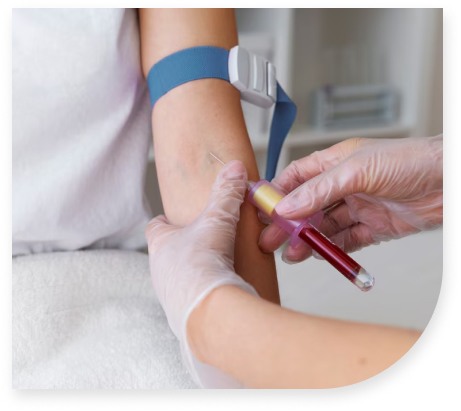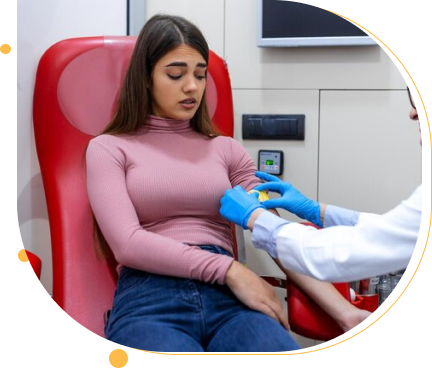Home > Prenatal Diagnosis >
Non Invasive (NIPT) Prenatal Testing

What Is NIPT?
We now know that some of the baby’s DNA circulates in the mother’s blood during pregnancy. DNA is the substance that our chromosomes are made of and contains our genetic information. By looking at the baby’s DNA found in the mother’s blood, we can identify whether or not the baby is affected by chromosomal conditions like Down syndrome. The baby’s DNA is lost from the mother’s bloodstream within a few hours of the baby’s birth, so testing is specific to the baby in the womb.
When Is NIPT Offered?
NIPT is offered based on a positive screening test for Downs Syndrome (FTS or Quadruple Test) as an alternative to Invasive Tests like Amniocentesis or CVS and as a primary screening option in many cases.
How Is NIPT Done?
The test is performed on a sample of the mother’s blood. Like a normal blood test, about 10ml (roughly one tablespoon) is taken from the arm. The blood is then sent to the laboratory for testing in a special box pack.
When Is The Time To Do NIPT?
Only enough DNA is present in the mother’s blood to conduct the test from 10 weeks of pregnancy, so the test cannot be done before then. You will need to have an ultrasound scan first to find out exactly how many weeks pregnant you are and whether there is more than one baby in the womb (such as twins) and to exclude fetal abnormalities.

How Accurate Is NIPT For Down Syndrome?
NIPT for Down syndrome is more than 99% accurate. This means that the test detects more than 99 out of 100 cases of Down Syndrome, so there is a very small chance that the test will not detect an affected pregnancy. Even though the test is highly accurate, there is still a very small chance (around 1 in 300) of an incorrect result. Therefore, if the result of your NIPT predicts that the baby has Down Syndrome, you will be offered an invasive test like Amniocentesis or CVS to confirm the result.
How Long Does It Take To Get The Results From NIPT?
It usually takes around 7-10 days, starting with the day the lab receives your sample. In a very small number of cases, the laboratory may be unable to obtain your results. This might be because there was not enough of the baby’s DNA in the blood sample to perform the test. If this happens you will be asked for a second blood sample so that the test can be repeated; there will not be any additional cost for this repeat testing.
What Are The Possible Results?
Highly unlikely to be affected – Negative Screening – the baby is very unlikely to have Down Syndrome, Edwards Syndrome or Patau syndrome. You will then continue with your normal care during the pregnancy.
Predicted to be affected – Positive Screening – the baby is likely affected with Down syndrome, Edwards syndrome or Patau syndrome. You will be offered an invasive test to confirm this result.
Inconclusive / Failed result – As this is a new test, we occasionally get inconclusive results due to inadequate fetal DNA in the mother’s blood. If we cannot detect a clear result, we will inform you and offer you a repeat or invasive testing like Amniocentesis.


How Safe Is NIPT?
The test is a blood test taken from the arm like a normal blood test. Therefore, the test carries no significant risk to you or your baby. As with all blood tests, there may be some bruising around the area where the blood sample was taken.
What Is Con Side Of NIPT?
It is more costly than the usually offered screening tests (like Double & Quadruple Marker test). With more use and advancement of technology, cost is expected to come down gradually.
